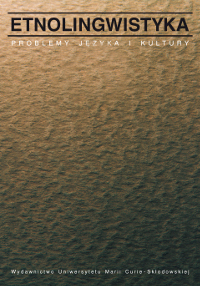DUNAJ W POLSKIM FOLKLORZE
The Danube in Polish folklore
Author(s): Jerzy Bartmiński, Urszula Majer-BaranowskaSubject(s): Anthropology, Language and Literature Studies, Customs / Folklore, Applied Linguistics, Cognitive linguistics, Cultural Anthropology / Ethnology
Published by: Wydawnictwo Naukowe Uniwersytetu Marii Curie-Sklodowskiej
Keywords: the Danube [Dunaj]; the Dictionary of Stereotypes and Folk Symbols [Słownik stereotypów i symboli ludowych]; poetism; symbolic meanings; the linguistic view of the Danube; the stereotype of water
Summary/Abstract: The authors present a proposition of an entry for the word Dunaj [the Danube] in the Dictionary of Folk Stereotypes and Symbols. The word dunaj in the Polish folk language, used as a common noun, is a poeticism denoting ‘great, deep water’; in proverbs and songs it takes on a wealth of symbolic meanings, e.g. freedom, youth, or love. It also marks the beginning and end of life, or spatial borders. In wedding songs, the word also denotes a route that connects people close to one another, and the concentration point of the lifegiving and sacral force. The linguistic view of dunaj is quintessential of the stereotypes of woda [water] and rzeka [river] fossilised in Polish folklore. In the Biłgoraj area, the word dunaj is associated with well-wishing carols for a girl or a boy with the theme of marriage – these carols are also referred to as pieśni dunajowe [lit. songs of the Danube River].
Journal: Etnolingwistyka. Problemy Języka I Kultury
- Issue Year: 8/1996
- Issue No: 8
- Page Range: 167-184
- Page Count: 18
- Language: Polish

